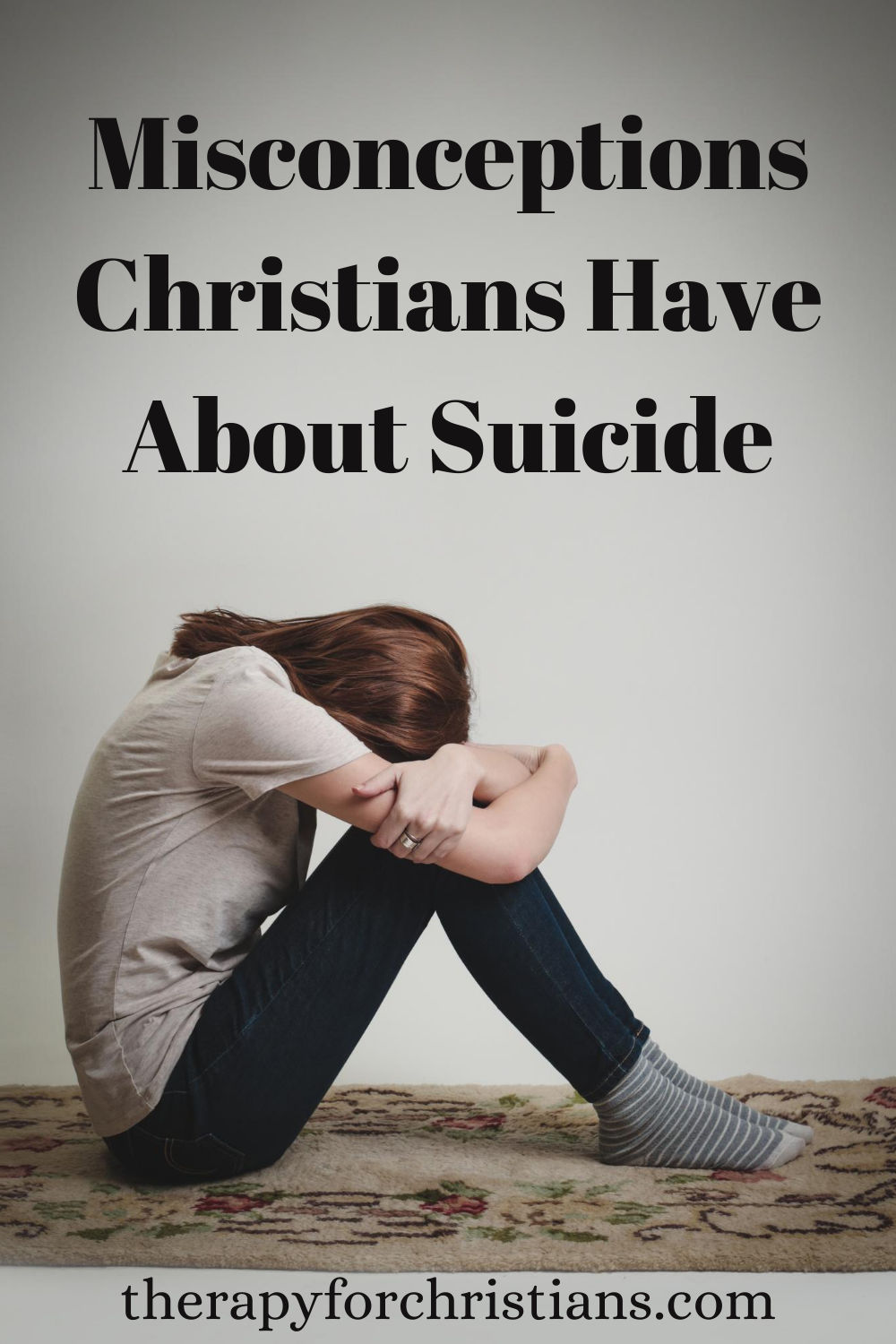

"Suicide" one of the most painful words in the English dictionary. One that torments a person before it happens and causes grief to their loved ones after it happens.
In recent times, many prominent men of God have died by suicide. Jarrid Wilson, Matthew Warren, and Andrew Stoecklein to name a few. These men loved the Lord, they loved the church, and they loved their families. Suicide does not diminish that, it doesn't diminish who they were and what they stood for. Mental illness took their lives, just like physical illnesses take lives. But unfortunately, many Christians would disagree.
For thousands of Christians, suicide is not an illness but a sin. This mindset is perhaps the reason Christians with mental illnesses look to the world for help. The church is supposed to be the place they run to, not run from, but for this to happen, misconceptions need to be cleared.
Misconceptions Christians have About Suicide
Below are 8 misconceptions Christians have about suicide. However, before we cover these 8 misconceptions it is important that you know that if you or a loved one is experiencing suicidal ideation, the National Suicide Prevention Lifeline is available 24/7 by calling or texting 988 if you need immediate assistance or just someone to talk to when you're feeling overwhelmed. Trained volunteers can assist you in navigating your circumstance, devising a plan of action, and returning to a calm, safe environment. You can also call 911 or go to the nearest emergency room (if you can do so safely).
Now here are the 8 most common misconceptions the church has about suicide.
1. Christians don't commit suicide
One of the biggest misconceptions is this, that Christians don't commit suicide. Well, they do. The pastors mentioned above are some of them, but there are hundreds, if not thousands more.
Christians aren't immune to suicide or other mental illnesses, just like we aren't immune to cancer. It can happen to anyone and contrary to popular Christian belief it does not mean they're going to hell. Samson died by suicide and was still regarded as faithful to God in Hebrews 11.
By no means am I saying that suicide is ever the right choice, all I'm saying is those affected are not exempt from God's saving grace.
Health Ads by
2. Suicide is an act of selfishness.
This is not an act of selfishness. Suicide is the end of an extremely dark road. Although it seems like a choice, it rarely ever is. Although it seems like they were selfish, they rarely ever are. In fact, people with mental illnesses usually feel like a burden on their loved ones. They feel like the lives of their loved ones will be better without them. They feel like they're constantly drowning and they fight. They fight every single day until they run out of energy to come up for air.
3. Suicide Sends You to Hell.
This misconception is the reason many suffering Christians don't turn to the church. For years, we've heard that committing suicide will lead to hell because suicide is murder.
Yes, the Bible is clear that suicide is murder, and that murder is a sin against God and His creation. But there is no scripture that says suicide separates you from God. In fact, Romans 8 tells us that nothing can separate us from His love, not even death.
While I can't argue that suicide is a sin, haven't we all sinned? And did Christ not come for people like us? We're all sinners, saved by the blood of the lamb. Pin It
Pin It
4. Being saved makes you immune to mental illness and suicide.
When people are sad and depressed, "snap out of it" is the advice they usually get. As if they're choosing to feel the way they feel. They're not choosing to feel this way, just like you're not choosing to feel the symptoms when you have a cold. Mental illnesses like physical illnesses are real and being saved does not make you immune to it. Yes, your faith will help you through tough times, yes you'll end up in heaven but no you're not immune to suffering here on earth. None of us are, and God never promised we would be.
5. Asking if someone is suicidal will make them suicidal.
This cannot be further from the truth. Asking someone who has not felt suicidal before will not make them suicidal. People with mental illnesses usually feel misunderstood, and for that reason, they don't know who to talk to. When you ask them that question, it lets them know that you care and you can handle what they're about to say. Never hesitate to ask, you may just be the answer to their prayer.
Health Ads by
6. People attempt suicide for attention.
I get it. Some people fake suicide attempts, they use it to get attention or to manipulate others. It's sad, but it happens. What would be even sadder, though, is to discredit a real attempt because you suspect it's fake. Take all attempts seriously because the fact is, even if they weren't serious, they still need help.
7. People who are suicidal always look depressed.
This is not true. Sometimes a person will look the happiest they've been in a long time before they die by suicide. When they feel at peace with their decision, many of them try to spend happy moments with loved ones. Matthew Warren was one of them. He spent that last day with his parents and they had no idea he would take his own life that night.
8. Suicides can't be predicted or prevented.
Suicide does not happen instantly. It's not an impulse decision. There are almost always signs and indications when a person is feeling suicidal. To prevent suicide we as Christians need to:
Know the signs. 
Know the signs. Isolation and withdrawal, with any suicidal talk, hopelessness, or preoccupation with death is a sign. A suicidal person would often crave connection, so reach out to people as often as you can. I am a huge had of the book "I Love Jesus but I want to Die". In this book, the author shares her lived experience with suffering from suicidal ideation and depression. She also covers in death on how to depressed and suicidal loved ones.
Be empathetic.
Listening before you speak. And when you do speak, respond with empathy. Learn as much as you can about how they're feeling and use words of support and encouragement. Pray with them. Let them know that they are not alone.
Respond quickly.
If you suspect someone is trying to commit suicide, do everything you can to confirm your suspicion. Find out if they have a plan, the mean and the timeframe. Then get help by calling 911 or taking them to the nearest emergency room.
Get professional help.
Do everything you can to ensure this person meets a professional. You can also call the National Suicide Prevention Lifeline, which is available 24/7 by calling or texting 988 to get more information on how you can help. Then be with them as they go through it, help the book an appointment, take them to it, ask them how it's going, it will make all the difference. Once the person is stabilized, you can find a Christian counselor by searching our directory.
Final Thoughts on Christians & Suicide
Suicide is a growing problem in many areas of the world. So let's work together in getting rid of these common misconceptions. Busting these myths will not only help prevent future suicide attempts, but the shame we've created around past ones as well.
People are dying. Loved ones are grieving. Christians should not be condemning. It's time that we show love instead of judgment. As the body of Christ, we should react as He would. Let's show compassion and empathy to our brothers and sisters who are suffering. They need it now more than ever, and you were placed in their life for a time such as this.
Before you leave, we would appreciate it if you helped us spread the word by sharing, tweeting, pinning, etc. this post.
About the Author:

Corine Williams, Ph.D. is Clinical Psychologist that is currently seeing clients through https://www.therapyforchristians.com/corine-williams. However, her passion is to write books that educate, uplift, and help provide parents with a tool to talk about difficult subjects. You can find out more about her at www.booksbycorine.com or by visiting her amazon profile here: https://www.amazon.com/Corine-Hyman/e/B00AWZ5FL2
Help us increase mental health awareness in the Christian community by donating through our paypal link here: www.paypal.com/therapyforchristians, joining our mailing list by clicking below, or join our provider list here: Provider listing
Disclaimer: the information, including but not limited to, text, graphics, images and other material contained on this article are for informational purposes only. No material on this site is intended to be a substitute for professional medical advice, diagnosis or treatment. If you are looking for a Christian counselor near you, please check out our directory located here: Christians Therapist Near Me
Featured Christian Therapists
Specialty Psychiatrist or Nurse Practiti... Located in Cedar Rapids, IA
View ListingSpecialty Psychiatrist or Nurse Practiti... Located in Grand Island, NE
View Listing.png)









